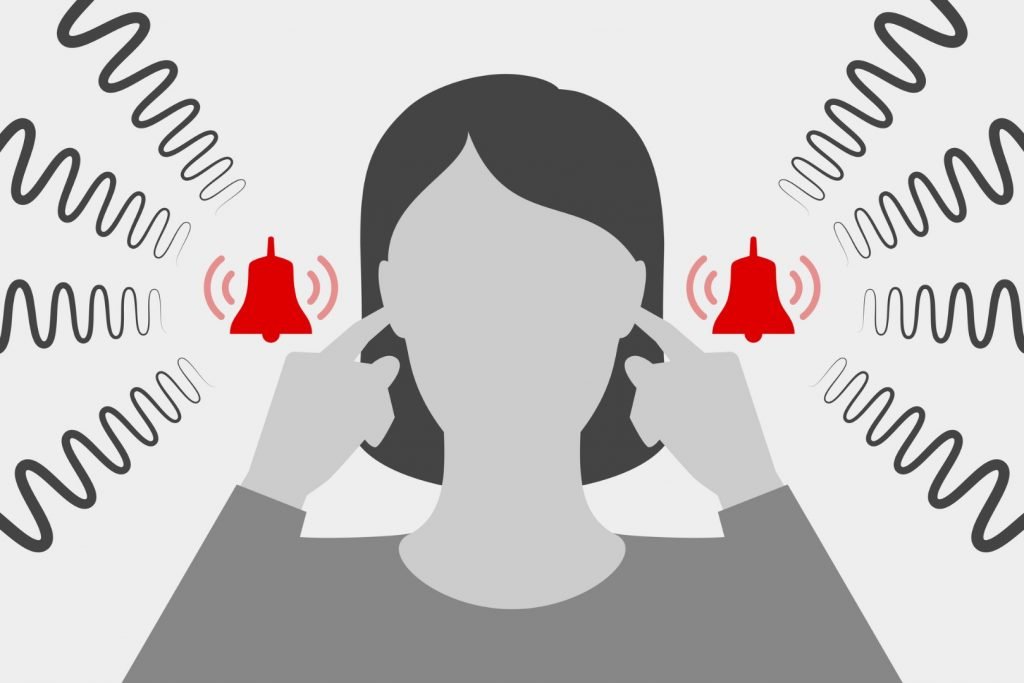Tinnitus can sound like any number of annoying tones, including ringing, buzzing, hissing or wheezing. It can be loud, soft, or any volume in between, and the sound can range from a low-pitched roar to a high-pitched squeal. It can be almost continuous or can come and go.

Symptoms of tinnitus
Common descriptions of tinnitus symptoms include cicadas, wind, crickets, fluorescent lights, running engines, grinding steel or dripping tap water.
It’s important to know that tinnitus can be a symptom itself—it’s linked to many different medical conditions, and even some medications can trigger it. It’s also strongly linked to hearing loss and loud noise exposure.
Chronic tinnitus
Occasional bouts of brief noise that lasts a few seconds are considered “transient” and something most people experience from time to time. A diagnosis of chronic tinnitus usually means a person reports episodes of tinnitus that last for at least five minutes and occur at least twice a week.
It’s possible to have tinnitus in one or both ears, and it can come and go. Tinnitus can get loud enough to interfere with concentration, and sometimes, it can mask natural sounds. Tinnitus is most commonly experienced by adults, especially those who have hearing loss.
Tinnitus is most commonly experienced by adults who have hearing loss.
In a very large survey of American adults with tinnitus, nearly a third reported having symptoms nearly constantly. About the same number of people noticed tinnitus at bedtime.
Note: If you experience tinnitus and sudden hearing loss, seek prompt treatment.
The emotional symptoms of tinnitus
Having a constant ringing in your ears is not pleasant, and you may have trouble falling asleep or concentrating at work. The constant annoyance, lack of sleep and inability to live your life as you used to may even cause increased anxiety. Anxiety is especially common if tinnitus is getting in the way of work or causing other stressful situations. Many people who have tinnitus often describe a connection between tinnitus perception and stress. You may even suffer from depression or thoughts of suicide in response to the persistent buzzing or ringing that feels inescapable. Along with treatments, behavioral strategies can make tinnitus more manageable.
Track your tinnitus symptoms
Having a good grasp of the tinnitus sounds you hear when you hear them and how often you hear them may be able to help your hearing care professional or physician determine the best way to treat your tinnitus. Keeping a symptom diary for a few weeks is a good idea. common if tinnitus is getting in the way of work or causing other stressful situations. Many people who have tinnitus often describe a connection between tinnitus perception and stress. You may even suffer from depression or thoughts of suicide in response to the persistent buzzing or ringing that feels inescapable.
A tinnitus evaluation from a hearing healthcare practitioner will begin with a series of questions designed to get a clear description of your symptoms such as:
- How long has this been going on?
- Is it regular or constant?
- Are the symptoms worse at certain points of the day?
- Which ear is causing the issue? Both?
- How loud is the noise?
- Is the pitch high or low?
- Is the issue extremely bothersome or just a little irritating?
- Are there certain conditions that make the symptoms worse, such as exposure to noise or caffeine intake?
- Does the sound ever change?
- Do you also suspect you might have hearing loss?
Can tinnitus sound like by clicking?
In most cases of tinnitus sounds like a ringing, hissing or buzzing sound. If you do hear a persistent clicking sound, it’s worth investigating, though.
For some people, brisk walking can cause a seismic motion called seismic impact, causing contraction of small bones and/or muscles of the middle part of the ear. You can experiment to find out if a click exists to see if it is the reason for it to move slowly and smoothly. Then, click and listen, try to move very fast and fast to see. You can also test for seismic effects by moving your head up and down quickly.
If you detect seismic effects, it is nothing that indicates a serious medical condition. However, if it is a constant annoyance, by all means, discuss it with your hearing care professional.




